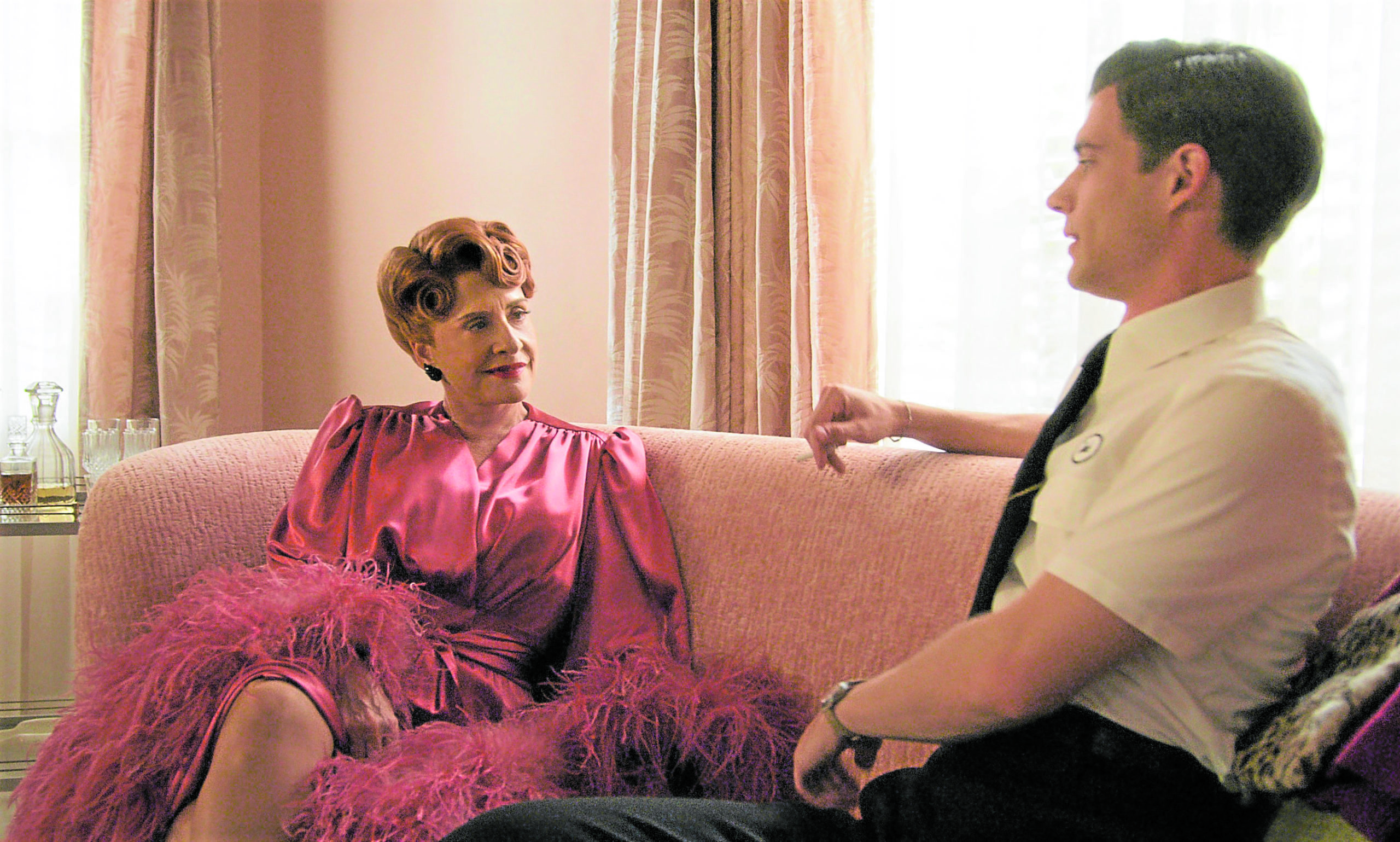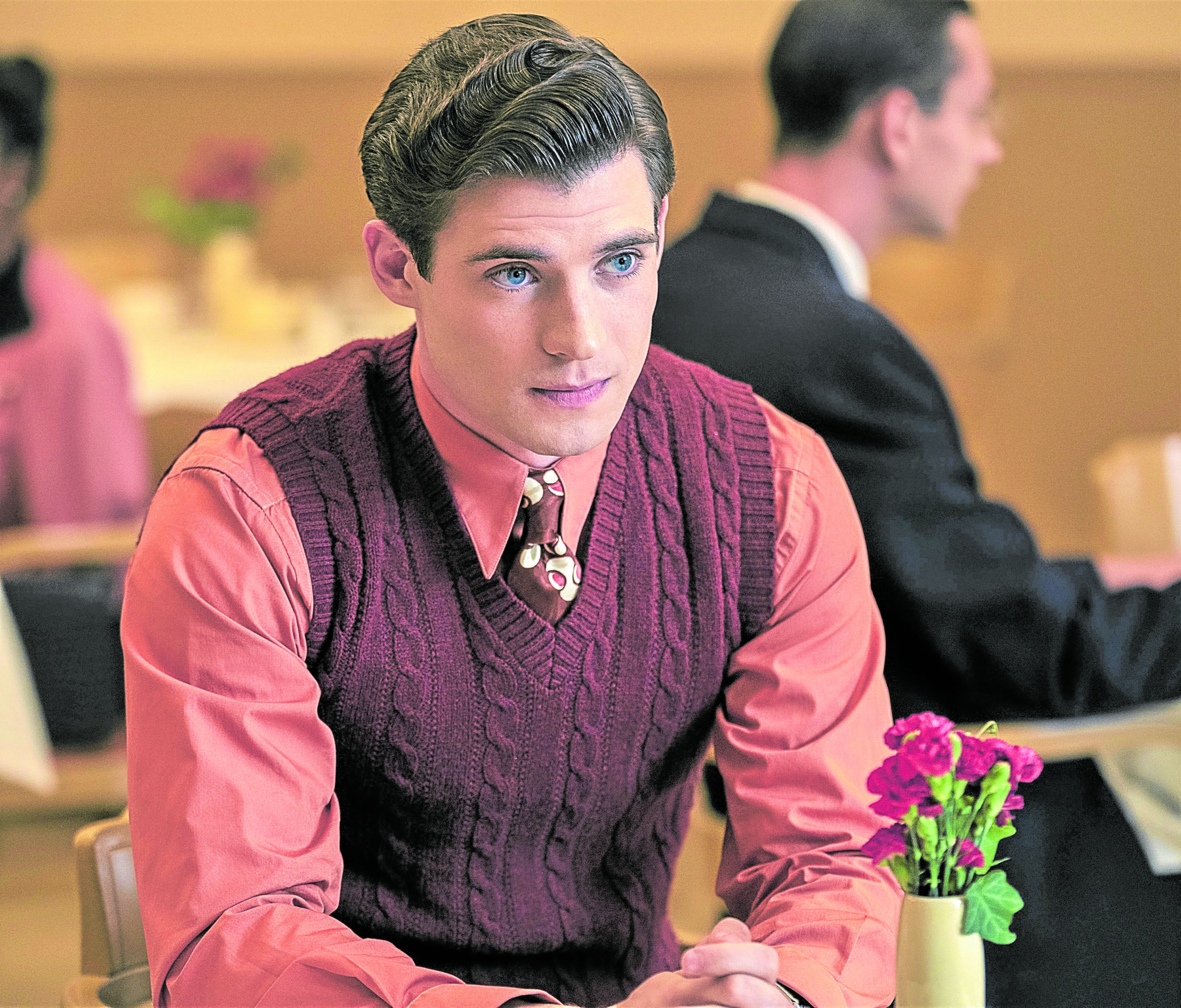New Hollywood sensation David Corenswet reacts to Patti LuPone’s playful tweet about their sex scenes

Corenswet (right) with Patti LuPone in “Hollywood” —PHOTOS COURTESY OF NETFLIX
LOS ANGELES—“Who doesn’t want a sex scene with David Corenswet? Who? Excuse me, who?”
Patti LuPone posed those playful questions in her recent tweet, referring to her sex scenes with David in Ryan Murphy’s limited series, “Hollywood.”
I asked David for his reaction, via e-mail, to the Broadway icon’s tweet. He came back to me with an equally playful response to Patti: “Who? Who?!? Do you want it alphabetically or chronologically?!”
The actor, who started getting internet love as River Barkley in “The Politician” and is now stirring more interest since “Hollywood” began streaming, added in his just-as-humorous reply to Patti, who plays Avis Amberg, the lonely wife of a studio mogul:
“This is the problem with fiercely talented, incredibly sweet and wildly successful actors like Patti. They’re pleasantly oblivious to the struggle that someone like me endures to arrive at a love scene with someone like them. Sure, it’s easy for her to say that. She’s her!
Article continues after this advertisement“But for the rest of us … boy, if I could tell you the number of people who’ve told me (in writing, no less) that they didn’t—and still don’t!—want (to have a sex scene with me) … but I’m getting all worked up.”
Article continues after this advertisementIn “Hollywood,” David, as Jack Castello, an aspiring actor in the 1940s who moonlights as a gigolo in a gas station that also doubles as a brothel, gets to have several sex scenes with Patti’s Avis.
The “full service” gas station is inspired by a real one on Hollywood Boulevard, began in the late 1940s by Scotty Bowers. Dylan McDermott portrays a character based on him in the Netflix series. Truth and fiction are also intentionally merged by Ryan in his reimagining of a Tinseltown where yes, racism, sexism and homophobia exist but fantasy, happy-ending optimism permeates the series.
David, who is Hollywood’s new sensation, hails from Philadelphia, Pennsylvania, where he began acting at a young age, appearing in plays and musicals from “All My Sons” to “Hairspray.” David’s late father also acted onstage.
David also shares another thing in common with Patti. They both earned Bachelor of Arts degrees from Julliard.
The 26-year-old actor’s credits include playing Reed, the college flame of Robin Wright’s character in “House of Cards.”
From playing the love interest of Ben Platt’s Payton in “The Politician,” David jumped to one of the leads in “Hollywood,” which also stars Darren Criss, Jim Parsons, Laura Harrier, Jeremy Pope, Jake Picking, Michelle Krusiec and Joe Mantello.
David’s resemblance to Henry Cavill is often pointed out, prompting suggestions that he could be the next Superman.

David Corenswet
Excerpts from our video interview with David:
When did you learn that such a “full service” gas station really existed?
I first learned about that when I read Scotty Bowers’ book, unrelatedly for a different thing a couple of months before. On the one hand, once it was laid out in detail, it seemed like, well, yeah, of course. People are people, and they have their needs and strange hang-ups and fetishes. Everybody’s got to find it somewhere.
And in those days, a gas station was as good as any place.
Part of “Hollywood’s” story is about people getting breaks because somebody believed in them. Who was that person who believed in you?
There are two versions of that. One is the person who gave me the opportunity, kind of spiritually—my high school theater teacher. I had been acting for a long time as a kid in Philadelphia, but my high school theater teacher, Phil Brown, really challenged me. He said, “This is a serious discipline and if you’re going to have a career as an actor, you need to take it seriously.”
And then, there’s nobody better than Ryan Murphy to believe in you. When you’ve got somebody who has had that much success in so many different shows… Ryan has a lot of power and is somebody who can pick you out and say, “You—I’m putting you in my show and that’s going to be the beginning of your career.”
So, early on, you have a lot of people who believe in you, if you’re lucky. But it takes somebody who can really make things happen to push things forward. So, Ryan is that guy for me.
Do you feel sometimes that it’s your looks that got you those opportunities?
A lot of actors spend a lot of time early in their career coming to terms with how they look to people and what roles people see them fitting into.
I spent several years towards the end of my time in school and after I graduated school, auditioning and getting a lot of feedback that I did not fit into the places I was supposed to fit into. So, the only thing you can do as an actor is just focus on the things you can control, which is the work.
But the really cool thing was that “The Politician” and “Hollywood,” the roles and the way Ryan described them to me made it clear that he saw … what I could do as an actor.
With River (in “The Politician”), it was specifically being very still, calm and quiet. I was not always that way as an actor.
Then with “Hollywood,” I grew up watching movies from the 1940s. I love imitating that dialect, the cadence of the voice, the way they walk and talk, the way they handle their hats. And just that Jimmy Stewart or Gene Kelly spirit of optimism and bright eyes.
So, when he said he wanted me to do this, I felt as though he had seen into my soul somehow, and he seems to have a gift for doing that.
In tackling this role, what are your reflections about how different the conditions were for actors in those days?
It’s illuminating the challenges that are different for different people. Depending on your background and what you look like, and what your sexuality is. Some of which were certainly a lot worse back then, but some of which persist today.
The big thing is just that there’s more communication these days. More are out in the open. So, it’s great to be able to have discussions about difficult subject matter, whether it’s how you make a career for yourself, how you get started, and who you trust along the way.
In your research for the role, what surprised you—good and bad?
The thing that surprised me, both good and bad, was the style of acting. There are all these incredible moments that are timeless. Marlon Brando saying, “I could have been somebody.” Jimmy Stewart in “Mr. Smith Goes to Washington.” Those are great moments of acting that are still great moments when you watch them today.
But I was surprised at how, with many of these great films, I felt I couldn’t relate to because the acting was too demonstrative or the style of filmmaking was a little too theatrical.
On a more personal note, what was the most embarrassing moment you’ve had and your defining aha moment?
The most embarrassing moment that still embarrasses me today is, I snuck out of my house when I was 5 or 6 to go down the street and have a playdate with my friend. I didn’t tell my mom I was leaving. My mom understandably called the police because I wasn’t in the house. When I got home, there was the embarrassment in that moment of having caused so much trouble for no reason. And then my aha moment, we talked earlier about not knowing how to be still and quiet as an actor, especially onstage where the adrenaline is rushing through you. I got to do a play with Reed Birney, who’s a terrific Broadway actor and has had a long and storied career.
My aha moment was watching him onstage. We were doing a Tom Stoppard play (“Hapgood”). A very funny, very complicated play. I thought that was my aha moment—like, if I can learn to do that, I’ll be golden.
E-mail: [email protected]
Follow him at: @nepalesruben/twitter.com